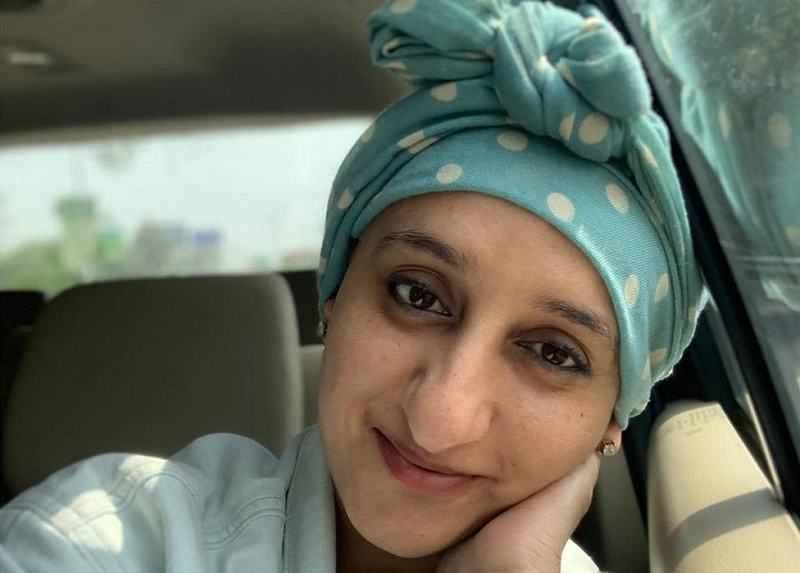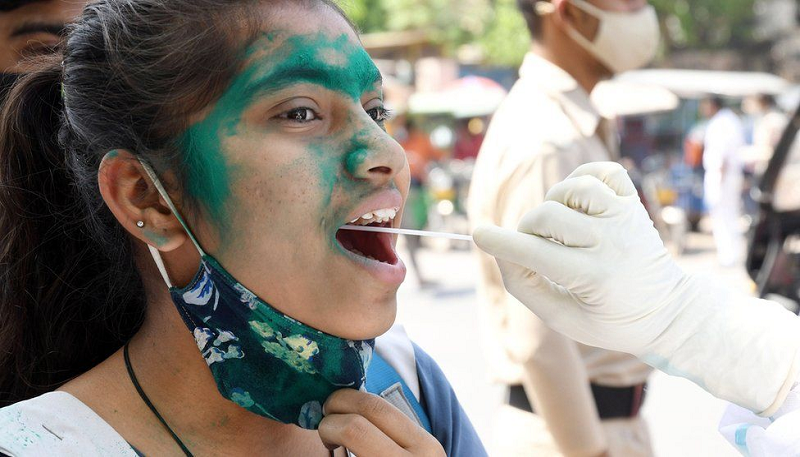
When 37-year-old Shikha Goel was diagnosed with breast cancer three months ago, life came to a grinding halt.
The Delhi-based founder of fashion label Ilk had to reorganise everything around her.
Her work, her friends and her future plans momentarily took a backseat.
The initial shock was too much to handle, but she picked herself up and decided to fight the disease with support from her family and friends.
She launched a social media initiative to encourage more women to routinely get screened for breast cancer. What followed was an urgent surgery and prolonged rounds of chemotherapy.
She visited hospitals several times in the first month and "it was all going fine". But then the number of Covid-19 cases started rising in several states, including Delhi.
She frantically began scouring the internet for information on Covid-19 and cancer. Soon she realised that she was at higher risk of infection and, if she caught the virus, the consequences could be dangerous.
The possibility of a "double whammy" frightened her, but also strengthened her precautionary measures while visiting hospitals.
She says vaccination is the more "secure way" of keeping Covid away, but she can't get the jab because she is not eligible for it.
And she is not alone - India has tens of thousands of young patients who are in the high-risk category and need vaccination urgently.
But India is yet to allow people under the age of 45 to get vaccinated even if they are diagnosed with a life-threatening disease, which makes them more vulnerable to a Covid infection.
This was "heart-breaking" for Shikha, who contacted several hospitals to get vaccinated but wasn't successful. She says she will keep trying "to check with different hospitals until she finds a way out".
"I am doing well in beating dreaded cancer and I am on the mend, but the risk of Covid doesn't let me sleep," she says.
She still has several rounds of chemotherapy left, which can only happen in hospitals where the risk of getting Covid is high.
And cancer patients like her are especially vulnerable.
The European Society For Medical Oncology has advised governments across the world that cancer patients should be prioritised - irrespective of their age - during Covid vaccination drives.
A study published in Nature has also advised countries to prioritise vaccination for specific cancers.

Several countries like the UK have been prioritising high-risk groups such as patients with specific cancers. The US Centers for Disease Control and Prevention has also recommended vaccination for people (16-64) with underlying medical conditions, which increases the risk of serious, life-threatening complications from Covid-19.
Prominent Indian oncologist Dr Ganapathi Bhat, who has treated hundreds of cancer patients, says it's concerning that the government has not allowed younger cancer patients to get vaccinated.
He says cancer patients are immunocompromised, they are at high risk for severe Covid-19 infection and outcomes include delayed recovery and higher mortality rates.
"Therefore, it is an utmost priority to protect their health, so that they continue their treatment without interruption," he says.
Some have argued that a blanket permission to allow all cancer patients to get Covid jabs is not feasible.
Dr Bhat says patients with acute leukaemia and those undergoing stem cell transplant need expert advice before they can be vaccinated against Covid.
But doctors are not allowed to make that decision at the moment. Dr Bhat says treating oncologists should have the choice to prescribe Covid jabs to their younger patients after clinical evaluation.
Shikha says her doctor has advised her to get vaccinated "as soon as possible as he is really worried".
"The hunt for the vaccine has been draining," she says, adding that being diagnosed with cancer causes "unimaginable physiological stress".
"But not getting the vaccine has increased that stress a thousand times more. We deserve better care," she adds.
The Indian government on Tuesday opened vaccination for people between the age of 45 and 59, but it did not say anything about the high-risk category under the age of 45.
It said further relaxation would be announced when the current phase of the drive is complete.
Doctors agree that cancer patients are more at risk because hospital-acquired Covid-19 is a reality.
Dr Om Shrivastava, a prominent infectious diseases specialist, says that many patients suffering from life-threatening diseases have to visit hospitals for procedures like chemotherapy.
"They are always at risk of contracting Covid at hospitals and getting them vaccinated should be picked up urgently," he says.
But he also adds that he understands why the government did not include younger people with comorbidities in the first round of vaccination.
"Supply was limited initially and they had to calibrate," he says.
But now more than 50 million Indians have been given at least one dose of the vaccine, and Dr Shrivastava believes "now is the time to focus on vulnerable groups under the age of 45".
Dr Bhat agrees, adding that a separate policy has to be made for cancer patients which looks at critical issues like finding out the right interval needed between the two doses of the two vaccines - Covishield (AstraZeneca) and ingenious Covaxin - which have been approved in India.

A recent study by King's College London and Francis Crick Institute found that "antibody responses at week three, following the first dose of the vaccine (Pfizer-BioNTech), were only 39% and 13% in the solid and haematological cancers, compared to 97% in those without cancer".
But the study found that when the same patients were given the second dose of the jab three weeks after the first one, "the immune response improved significantly for solid cancer patients with 95% of them showing detectable antibodies within just two weeks".
"By contrast, those who did not get a vaccine boost at three weeks did not see any real improvement," it concluded.
India has recently increased the interval between the two jabs from 4-6 weeks to 4-8 weeks, but there is no separate policy for high-risk patients in any age group at the moment.
And it's not just young cancer patients who require urgent vaccination. India has tens of thousands of chronic kidney disease patients who also require frequent hospital visits for dialysis.
Professor A Fathahudeen, who heads the pulmonology department at the Ernakulam Medical College in Kerala state, says he saw many such patients pick up the coronavirus infection from hospitals during the first wave of the pandemic in June.
"Such patients [who are under the age of 45] need to be prioritised urgently. Not many can afford getting dialysis at home, and we can't leave them to their fate, they need our help," he says.
"I can argue that a 30-year-old cancer or chronic kidney disease patient is as much at risk as a 50-year-old manageable diabetes patient."
Sarath KB, 33, is one such patient. He requires three dialysis sessions per week and the risk of getting Covid worries him.
"I want the government to open up vaccination for high-risk patients - irrespective of age groups," he says.
Shikha agrees.
"We can only worry about one thing at a time, give us a fighting chance against Covid."
(BBC)